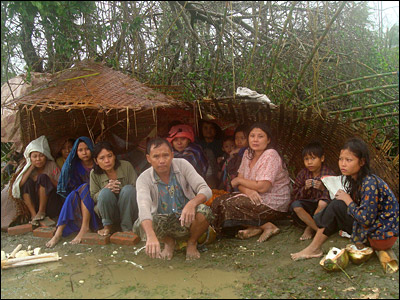In the town of Myaungmya, which was moderately affected by the cyclone but had become a magnet for survivors from deeper in the delta, there are now just eight temporary settlements, down from 30 a week ago, one aid worker said.
Frank Smithuis, country director of Médecins Sans Frontières (MSF), told IRIN that authorities in Labutta were closing all temporary settlements in the crowded town centre and offering residents a choice of returning to their communities or relocating to new settlements several kilometres outside town.
Another international aid worker, who visited Labutta early last week, said survivors heading back to their villages had been given supplies, including blankets, cooking utensils and 10 days' worth of food, and had been promised more.
He was told that 10,000 cyclone survivors had already left the town.
Their comments follow unconfirmed reports that people were returning to villages lacking adequate shelter, food, water, health and sanitation services.
The UN estimates that until recently about 260,000 people had been staying in temporary settlements in 14 different townships.
The reported settlement closures come as Myanmar authorities hope to ensure that the rice-planting season, which begins now and lasts for the next few weeks, is not lost.
But according to the UN, such premature returns should be avoided.
"We do not endorse premature returns to areas where there are no services," Terje Skavdal, head of the regional office for Asia and the Pacific of the UN Office for the Coordination of Humanitarian Affairs (OCHA), said on 30 May in Bangkok. "People need to be assisted in the settlements, and satisfactory conditions need to be created before they can return to their places of origin. This point has been made very clearly to the authorities."
At least 134,000 people were left dead or missing and up to 2.4 million others destitute after Cyclone Nargis slammed into Myanmar on 2 and 3 May.
Some survivors moved into monasteries and school buildings, while others were given shelter in government-established tent camps.
Speaking at a press conference over the weekend, Major-General Aye Myint, Myanmar's deputy defence minister, said: "The resettlement and rehabilitation process will be speedy."
 Photo: Wikimedia Commons  |
| A map of Myanmar and surrounding countries highlighting the Irrawaddy (also spelt Ayeyarwady) Delta |
However, UN agencies have expressed concern over their ability to ensure a steady food supply and other services to those who go back to their remote scattered villages, especially given the devastated area's complicated geography.
"The real risk is that if people go back, and there is no access to them for the delivery of essential lifesaving services in their places of origin, they would pretty much become invisible and inaccessible to humanitarian workers," Anupama Rao Singh, regional director for the UN Children's Fund (UNICEF), told journalists on 30 May.
"Therefore, all of us would be faced with a risk of a second wave of disease and disaster," she warned.
To mitigate that risk, the World Food Programme (WFP) has been scaling up its food delivery pipeline and now has the capacity to ensure deliveries in some remote areas.
Paul Risley, a WFP spokesman, said the agency, with its partner organisations, could distribute an estimated 400 metric tonnes (MT) of food a day, in part with a fleet of more than 30 boats able to travel through the delta's narrow waterways to reach otherwise inaccessible villages.
However, that logistics pipeline still needed to be expanded, he said.
While WFP initially estimated it would need to distribute about 380MT of food a day to about 750,000 people, it now estimates that 1.5 million people require food assistance.
 Photo: David Swanson/IRIN  |
|
"We do not endorse premature returns to areas where there are no services." |
|
Terje Skavdal, Head of the Regional Office for Asia and the Pacific for OCHA in Bangkok |
"If we start delivering food on a regular basis for all survivors, the village chief will put out the word, and people will come back to their areas," he said.
The WFP, the International Federation of the Red Cross, MSF and other agencies say one problem in scaling up the aid effort in remote locations is obtaining permission for their international technical experts to work in the disaster zone, despite Myanmar's promise to allow all "genuine humanitarian workers" access to the delta.
Workers have to apply for travel permits, outlining their itinerary and proposed activities, but approval had been slow. Numerous foreign specialists remain stranded in Yangon, the former Burmese capital, awaiting clearance to travel.
ak/ds/mw
This article was produced by IRIN News while it was part of the United Nations Office for the Coordination of Humanitarian Affairs. Please send queries on copyright or liability to the UN. For more information: https://shop.un.org/rights-permissions





